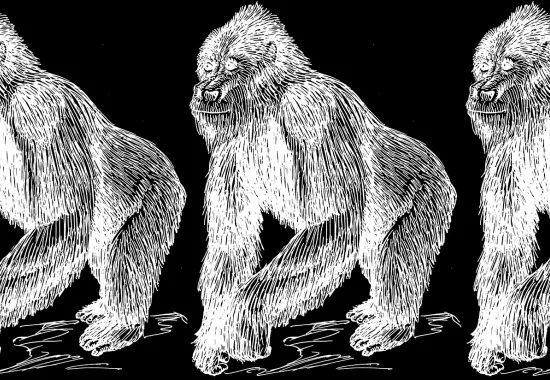Proposing a World without a Mother: Grief and Creative Nonfiction as a Sense-Making Tool
INTRODUCTION
Problem.
To put it simply, “parents die as we age” (Safer 49). I am an outlier in this century, as most people lose their mothers when they are between forty-five and sixty-four years old (Safer 49). I was thirty-seven. But to put it more simply, parents die. Mothers die. My mother died.
All summer long it was the summer your mother would die, but you didn’t know it. You were distracted by the university’s decision to close the scholarly press where you worked, the backlash. You went to your first writers’ conference at Sewanee, right off the highway along the way home.
But we expect that our parents will die, abstractly, at some point. The problem, therefore, is not death but life; the problem, the unresolved difficulty, is how to go on living after a loved one’s death. And worse, the problem is an inherently personal and specific one.
It is absolutely wrong that anything should change. It is absolutely wrong that anything should stay the same. This includes you. This applies exclusively, at heart, to you.
Question.
But even while we feel we cannot go on, we know that people do and that we likely will as well.
This is what you write the first time you write it, that first night: “This is the world without a mother.” It was already difficult to remember her face before she was sick. You knew her voice would go, too, fraying at the edges until it would become more made up than remembered.
The world is full, as much as we might not want it to be, of anecdotal evidence. Perhaps we ask ourselves what tools others have used or created in order to go on. Selfishly, the question is: How do I go on with living, every day in its everydayness, after the death of my mother?
This is the world without your mother—too much the same—a world of breath, a world where people open and close their mouths, their eyes.
Thesis Statement.
Or, Doesn’t Writing It Make It True?
You haven’t written about your mother’s death. You are afraid to write. Writing makes it true. Writing means you are alive, that you are going on somehow, so you don’t do it.
People make sense of their grief through the same methods they use to make sense of their worlds and lives generally; they go on by engaging in those same meaningful activities that allow them to go on. As a writer, I expect that exploring my grief through creative nonfiction will allow me to figure something out about that grief, about my mother’s death, that will in turn allow me to go on, if only for a while,
Your therapist says you will probably miss your mother more as time goes on. That for adult children who live some distance from their parents, it’s normal not to see them for months at a time, so it doesn’t hit you all at once.
if only until I must write something else that will allow me to go on for a while.
About a year after your mother’s death, you develop a lot of anxiety. Not that anyone could accuse you of not being a worrier already, but you feel anxiety in your body all the time. You tell your husband at dinner that you might flunk out of library school. You lie awake in bed, your heart beating fast, thinking of alternate routes downtown so you can avoid the hill you've driven every day since you moved to Missouri. You go back to therapy. Your therapist points out that you've stopped all your anxiety-releasing activities. You tell her you will think about writing. You admit that running three times a week is something you could easily do, but when you try it is painful to start over, and you are not even sure you want to run. Perhaps running is a pre-"bad year" activity. You think of it, refer to it, as "the bad year." Now it is more than one year after the bad year, and you are thinking about what you can do to feel more like yourself, but you don't care enough to do those things yet. You start to get rid of the pre-bad-year clothes because they remind you of the bad year. You start to get rid of the first post-bad-year clothes because they remind you of the bad year.
Statement of Significance.
Or, As the Creative Writers Say, “What’s at Stake?”
What is at stake for all of us in our individual grief is ourselves and our worlds. Why then a public account of private grief? The way we understand grief best—or second best to personal experience—is the way we understand everything second best, through the particular stories of others’ experiences. As a person, “[my] task in [my] own mourning and grieving is to fully recognize [my] own loss, to see it as only [I] can” (Kübler-Ross and Kessler 31).
When the dreams come, your mother does not know she is dead. In the dream that is like a dream of dreams, she is in the car with you on the way to her own burial. You don't want to get there. You don't want her to find out the grave is hers. Your sister tells you that she dreams of her tongue splitting, falling out in pieces, and you have one sympathy dream like this for her,
It started with your tongue swelling. You knew it was from diet soda. You didn’t want them to operate. You told them what had happened to your mother.
They said they had to do it anyway.
Your tongue swole up so much it was like a second tongue had formed on top—you peeled it off.
They said they still had to do it.
You didn’t want them to cut up your arm and leg just to die. You asked if they would just cut your tongue out and be done with it.
They said they had to do it.
but you return to your own dreams, unable to share even this aspect of grief with another person.
As a writer, I know that my story is significant because all of our stories are; the challenge is to present that story so that readers experience a bit of it with me, to contribute to the written record of the common—and painfully unique—human experience.
You pack a large suitcase, plan on staying a while. You pack about ten dresses, knowing one of them will be the dress you wear to your mother’s funeral, but you will not make that decision now. You pack several notebooks, and the one with baby blue, aquamarine, and lime flowers on a gray background becomes the one. The notebook of your mother’s death.
Purpose.
Or, (Write It!)
This essay aims to illustrate one person’s struggle with grief through the form of creative nonfiction. Generally, I hope that my writing will fulfill the promise of why I think we all read, to be made to feel.
When your brother-in-law picked you up at the airport, your mother was in the E.R. The day before, a doctor had performed a biopsy on her tongue to confirm that the new tumors were cancerous, and now they wouldn't stop bleeding. Your mother on the bed in the E.R. looked tiny, little child legs kicking under the hospital blanket. At 61, she had shrunk four inches from the height noted in her senior memory book. She had lost forty pounds from her pre-cancer weight. She was as tiny as you now. Your mother was unable to close her mouth, the tumors needing room. A thick bloody saliva poured from her mouth. There was a smell around her. The biopsy to confirm cancer required by insurance? She was dead in two days. No one ever received the official results.
And as Robert Frost famously said, “No tears in the writer, no tears in the reader. No surprise for the writer, no surprise for the reader” (777). It is difficult to write something meaningful without figuring something out, and what I hope to figure out is otherwise inarticulable, the knowing or feeling or slight internal movement that the writing itself creates.
Scope and Limitations.
This essay is a personal reflection and journey into my particular grief over my mother’s death.
Your mother had a notebook, too. When the tumors’ swell prevented her speech, she wrote in a red wide-ruled one-subject notebook. Few pages were left. Five pages have her handwriting on them. Nine are blank. Your sister wanted to throw it out, called it “morbid,” but you couldn’t let go of her last words. It’s a weird blessing and curse, to have her last few thoughts in their exact form but at the expense of her being able to say them. At the end she writes in all caps because it is easier. She was just getting some strength back in her right hand where they cut muscle from the forearm to remake her tongue.
As the journey will be lifelong, this essay can only capture one attempt to reconcile my grief with the mundane yet inescapable imperative to go on.
Definitions.
Or, Words Are All We Have.
Mourning is how we present our grief on the outside, or how society expects us to present our grief, “the external part of loss.” (Kübler-Ross and Kessler 115).
When the funeral home people came to collect your mother, they wheeled her from her bedroom into the living room on a stretcher. They paused by the piano, the front door open, and made you say goodbye, even though you had been in the house with her body for hours, waiting. They had wrapped her in a sheet but left her face uncovered, her eyes still open, her mouth open, full of cancer.
Though we may no longer, as a rule, wear black, we find ourselves with expectations to fulfill just the same. A Facebook status relaying the time of death or of visitation or of funeral services is as clear an act of mourning.
At the funeral home, you and your sister and your aunt wanted a closed casket, but after a while, Daddy decided she would’ve wanted it open, so it was opened, and you had to see your mother’s face in death again. They had closed her eyes. When your great-aunt arrived from Alabama, she stood with you near the casket for a long time and reached in and petted your mother’s hands.
Grief is the feeling of bereavement, the sadness, the emotion itself (Kübler-Ross and Kessler 115, Attig 33).
Seeing Halloween hand towels at Kohl’s and thinking how much your mother would like the green one—Frankenstein’s monster’s face. Realizing that she is not alive to receive the package in the mail.
Grieving is the internal counterpart to mourning, the everyday labor of coping with loss (Kübler-Ross and Kessler 115, Attig 33).
Thinking at Christmas, “Just get through this.” Drinking a bottle of wine and vomiting into the toilet.
One night you drink a bottle of wine, not quick quick but too quick, and you are sick, lying on the floor of the little half-bath on the other side of the wall from the television. After a bout, you stay over the bowl and sob. Your husband asks what’s wrong, and you’re indignant that you should have to say what is wrong when what is wrong is what will be wrong forever. It’s not fair, you say instead. It’s not fair.
Telling yourself there’s no birthday card coming in the mail. Erasing your mother’s name,
Definition.
You will call your mother your mother. This bit of linguistic distance makes the essay possible, it makes you possible in this moment. At some point in childhood, as part of the larger project of realizing that your accent marked you and trying to emulate the middleclassness of your teachers, you would refer to your mother as your “mom” to select classmates. All of your real friends called their own mothers “Momma,” and it would be uppity to pretend you did otherwise. Now it’s been so long that to call her “my momma” to anyone except those you grew up with seems as false as those first “my mom”s probably did. In your head and in your heart, she is always “Moma,” the way she taught you to spell it. You tried once to use this spelling—the only true one—in a story in one of your early workshops, and you were rightly called out for it. The nonstandard spelling was confusing and distracting for readers. But every “your mother” on the page stands for a “Moma” in the internal world that this essay only scratches at in the dark.
Genita Gravley, from your passport.
Assumptions.
It is assumed that the loss of a parent is a sad event that produces intense grief and takes a significant amount of time, probably the rest of the bereaved individual’s life, to process.
You assumed that you’d want to write about your mother’s death, so you packed notebooks.
Your mother was not something to write about.
You brought your laptop.
Your mother was not a topic; she was not a theme.
Your mother was the only person in the world to call you “baby.”
You brought pens.
Outline of Steps to the Argument.
Or, Begin to Tell the Story of Your Mother’s Death.
Because I experience grief in fragments, in pieces, in jagged moments or images from memory, I write about my grief in fragments, allowing the content to fit inside this form
The morning of the day your mother would die, you and your sister awoke to the sound of her yelling at Daddy for doing the laundry wrong. This fussing seemed a good sign, something to get you up and out of the spare bed where you had slept.
as every piece of writing requires structure. The reader needs it to make sense of the argument, and the writer needs it to help formulate the argument, even if the argument is as personal and evolving as, this is the story that allows me to get through the day.
All day your mother insisted on figuring out the appointment she had the next day, when to leave, who was driving. There was no point in going, but the hospice nurse said to go along, to go through the battle of grinding and feeding her usual medications through the tube, but to stop feeding her the liquid nutrition. That you were only feeding the cancer.
In this form of an academic proposal, I explore the intersection of my own experiences and my own craft with current concepts in the fields of grief theory and creative writing.
Recommended
Schizophrenic Sedona
Recense (realized)
Notes on Hands





